|
|
|
Sort Order |
|
|
|
Items / Page
|
|
|
|
|
|
|
| Srl | Item |
| 1 |
ID:
182445
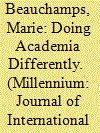

|
|
|
|
|
| Summary/Abstract |
In this article, I explore questions of pedagogy and knowledge-writing practices in their relation to knowledge production. Starting from the observation that different styles of writing are present in our work, but many of them are systematically pushed back and mis-read as non-academic, the article brings to the fore a discussion on the direct relationship between practices of knowledge-writing and those modes of knowing that escape the linear and propositional academic style while still being part of how knowledge comes into being. Following a tradition of intersectional feminist epistemologies, I engage with questions of epistemologies and critical pedagogies, speaking to and with several generations of scholars who address and work with questions of diversity and knowledge production that are seminal within International Relations (IR), yet underexplored from the perspective of knowledge-writing practices.
|
|
|
|
|
|
|
|
|
|
|
|
|
|
|
|
| 2 |
ID:
182442
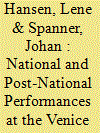

|
|
|
|
|
| Summary/Abstract |
This article makes three contributions to research on visuality and international relations. First, it provides a theoretical framework through which sites and their politics can be understood. Sites are places where certain objects and structures are shown and engaged with. Visitors to sites experience them visually and bodily and visiting sites is a social process. Second, the article introduces the format of the photo essay as an epistemology and a method through which the seeing of sites can be captured. Photo essays about site-specific seeing select photos that convey particular, embodied experiences. Photo essays make photos as important to the analysis as text and they adopt a suggestive form of writing that encourages the reader to see and respond to images in specific ways. Third, the article introduces the Venice Biennale as a site where international relations are performed. National exhibitions called ‘pavilions’ are a central part of the Biennale. Some pavilions invoke ‘the national’ as the privileged lens on world politics, other pavilions challenge this lens. The article provides an analysis of the Serbian, Armenian and Icelandic pavilions in the 2015 Biennale and the national and post-national performances they involved. The analysis draws on an original photo essay composed from a research visit and photo shoot in May 2015.
|
|
|
|
|
|
|
|
|
|
|
|
|
|
|
|
| 3 |
ID:
182441


|
|
|
|
|
| Summary/Abstract |
Much material heritage is marked by national memorials to war and its heroes. This article considers two examples that commemorate aspects of defeat, loss, and military disaster in war – the Australian War Memorial and attached museum and the museum and Peace Park at Hiroshima Japan. For Australians, the nation became a recognisable entity in the wake of disastrous defeat at Gallipoli in World War I. The physical manifestation of that heritage combines a solemn mausoleum with a massive and expanding museum that celebrates all Australia’s war contributions since then. For Japan, the peace park in Hiroshima focuses on the civilian heritage of the atom bomb Americans dropped in August 1945. Unlike the Australian Memorial, there is no celebration of war, soldiers, or militarism at the Peace Park. This article explores the differences, similarities, ironies, and contradictions of war heritages built out of crushing instances of loss rather than national moments of victory.
|
|
|
|
|
|
|
|
|
|
|
|
|
|
|
|
| 4 |
ID:
182440


|
|
|
|
|
| Summary/Abstract |
Genocidal violence centrally targets the social bonds that hold communities together. In postcolonial contexts, it is well documented that social relations can be characterised by heteronormativity. Furthermore, postcolonial scholars have done extensive work on demonstrating the link between colonialism and genocidal violence. Responding to a gap in the academic literature, this article interrogates the relationship between (post)colonial heterosexuality and genocide. Seeing queer theory as also relevant to the study of non-queer individuals’ experiences, this article argues that postcolonial genocidal violence can be characterised by attempts to impede heterosexual group reproduction. Using the Rohingya Genocide in Myanmar as an illustrative case-study, it argues that the emergence, character and legitimisation of violence here depended on the construction of heteronormative subject-positions. Furthermore, it argues that genocidal violence reinforces the subject-positions it is rooted in, giving them the appearance of immutable facts. From this basis, the article concludes that postcolonial genocidal violence can be read as a performance of heterosexuality.
|
|
|
|
|
|
|
|
|
|
|
|
|
|
|
|
| 5 |
ID:
182443
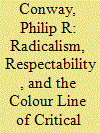

|
|
|
|
|
| Summary/Abstract |
The epithet ‘critical’ has become both coveted and contested. A long-established lodestone of personal, political, and professional commitment within academia, its meanings are multiple, and its histories are poorly understood. This article reconstructs an interdisciplinary history of debates concerning what it is to ‘be critical’, beginning in the 1930s but focusing on the late 1960s to the late 1990s. It argues the significance of the category ‘critical’ to be that it can connote political radicalism while allowing for a degree of professional respectability. Furthermore, the article shows that claims and counterclaims upon the parameters of criticality have privileged certain thought traditions. In particular, while contemporary discourses of ‘anti-wokeness’ caricature critical academics as being prepossessed with issues of coloniality and race, traditions of thought dealing with these issues have, until recently, been rather marginalised. The enduring ‘colour line’ of critical thought is not only unjust but also deleterious to political imagination.
|
|
|
|
|
|
|
|
|
|
|
|
|
|
|
|
| 6 |
ID:
182438
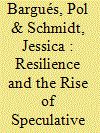

|
|
|
|
|
| Summary/Abstract |
This article explores the nature of resilience-informed international interventions today by thinking about ‘difference’. Up to the 1990s, international interventions were often characterised by a patronising tone in which backward others needed help to develop. Some 20 years later, key lessons learned were that others were so fundamentally different that efforts to assist them invariably failed. This article argues that contemporary approaches seeking to foster resilience are simultaneously propelled by both approaches. They are thus underpinned by two conflicting understandings of difference: the other that is in need and the other that cannot be attended. Even more, we contend that this contradiction is put to productive use in resilience-building: protracted crises today demand practitioners to ‘be there’, engaged permanently, to speculate, experiment, and affirm radical uncertainty. In order to analyse the novel features of resilience, we draw on Graham Harman’s speculative realism and look at policy programming of the Syrian refugee crisis.
|
|
|
|
|
|
|
|
|
|
|
|
|
|
|
|
| 7 |
ID:
182444
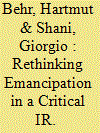

|
|
|
|
|
| Summary/Abstract |
This article seeks to reconceptualise emancipation in critically theorising International Relations (IR) by developing ‘thin’ and ‘thick’ versions of normativity and applying them as conditions for a pluriversal dialogue between different cosmologies. We start with the premise that ‘critical IR’ is both Eurocentric and a-normative, and argue that a normative engagement with critical discourses both inside and outside the West is necessary to recapture its emancipatory promise. Drawing on the work of Max Horkheimer, Herbert Marcuse and Jacques Derrida, we develop ‘thin’ and ‘thick’ versions of normativity. The former, we argue, operates as a critical corrective of thick normative positions, reclaiming their openness to difference, while not making substantive moral or political claims itself. We then apply these version of normativity to examine the possibility of a global pluriversal dialogue between different cosmologies. Cosmologies, we argue, refer to sets of ontological and epistemological claims about the human condition that are inherently normative. ‘Thin’ normativity applied to the ‘thick’ claims of cosmologies prevents the essentialisation and hierarchisation of cosmological difference(s) by revealing and de-constructing the latter’s potentially discriminatory, exclusionary, and violent tendencies. In so doing, it facilitates a global inter-cosmological dialogue which we regard as the objective of a post-western, critical IR.
|
|
|
|
|
|
|
|
|
|
|
|
|
|
|
|
| 8 |
ID:
182439
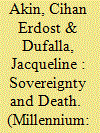

|
|
|
|
|
| Summary/Abstract |
This article assesses the politics of post-mortem visual representation in media. Studying different representation of death in Turkey and Russia, it explores the intersection of visual images, death, and sovereignty. The existing studies have established that dead bodies are pushed to the private sphere and rendered invisible in media representation. The case studies suggest we should not only focus on the corporeal visibility of the dead body but also on the representation of identity markers, such as the person’s face and associated symbols. On the other hand, some of the bodies are treated as objects; they are rendered invisible as nameless and faceless figures. Building on Agamben, this article suggests that post-mortem representation produces biologically dead subjects whose political lives are worthy of saving, those worth sacrificing, and the bare dead. Therefore, sovereignty resides not only in deciding the value of life but also of the dead.
|
|
|
|
|
|
|
|
|
|
|
|
|
|
|
|
| 9 |
ID:
182446
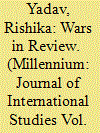

|
|
|
|
|
| Summary/Abstract |
This essay reviews four disparate studies on war narratives: ‘Right to Mourn’ by Suhi Choi (2019), ‘Fly Until You Die’ by Chia Youyee Vang (2019), ‘Soldiers in Revolt’ by Maggie Dwyer (2018), ‘Breaking the Binaries in Security Studies’ by Ayelet Harel-Shalev and Shir Daphna-Tekoah (2019). The studies take a ‘view-from-below’ approach and build new theoretical frameworks that not only expose ‘the price of war’, but also investigate how ‘subaltern subjects’ subjects view their place and participation in the conflict and resist over-arching homogenous interpretations. The studies respectively focus on post-war remembrance in South Korea, oral histories of Hmong pilots, mutinying in West African states, and the experiences of female combatants in the Israeli Defence Forces. Although dissimilar in terms of geographic spaces, actors and even methodology, the authors all commonly challenge established binaries within conflict studies that assume a separation of the ‘military’ and the ‘civilian’, the prevalence of power-hierarchies within armed forces, and the supposed passiveness of powerless actors in conflict. This essay reviews these books as not individual publications that contribute to the literature of their own disciplines, but as interactive theoretical frameworks that not only dispute prevailing theories of war but also present new understandings on how these narratives interrelate.
|
|
|
|
|
|
|
|
|
|
|
|
|
|
|
|
|
|
|
|
|